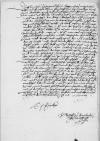 GStA, PK, HBA, C 1, No 537, f. 1 unnumbered
GStA, PK, HBA, C 1, No 537, f. 1 unnumbered
Durchlauchter(r), hochgeborner(r) furst, / hochgunstiger(r), vilgeliebter(r) her(r) und freundt. / Mein fruntliche und gancz willige dienst mit gotlicher(r) gnad(en) un(n)d aller seligheit wunschung zuvoran(n). /
Die weil es Got der almechtig gefuegt, / das ich mein Catherina von Höfen Dantiscus' sister, 1538-11-17 married Hans Glaubitz (CIDTC, IDL 5205; IDL 2425; IDL 4399)⌊svesterCatherina von Höfen Dantiscus' sister, 1538-11-17 married Hans Glaubitz (CIDTC, IDL 5205; IDL 2425; IDL 4399)⌋, E(wer) F(urstlichen) D(urchlauch)t underthan(n), dem erbar(e)n Hans Glaubitz (Hans Glaubicz, Johann Glaubitz), subject of Duke Albrecht von Hohenzollern, Dantiscus' brother-in-law, from 1538-11-17 married to Catherina von Höfen; at least in 1541-1543 commander in Seeburg (HARTMANN 1525-1550, No. 537,769, 771, 876, 914, 916; CIDTC, IDL 5205; IDL 2425; IDL 4399)⌊Hansen(n) GlaubiczHans Glaubitz (Hans Glaubicz, Johann Glaubitz), subject of Duke Albrecht von Hohenzollern, Dantiscus' brother-in-law, from 1538-11-17 married to Catherina von Höfen; at least in 1541-1543 commander in Seeburg (HARTMANN 1525-1550, No. 537,769, 771, 876, 914, 916; CIDTC, IDL 5205; IDL 2425; IDL 4399)⌋ zugesagt / und die eheslissung mit der wirtschafft uff den negsth sontag noch sant Merten(n)[1] geseczt, / so wolt sichs in keinen(n) weg anders bekuemen(n), dan E(wer) D(urchlauch)t mit den iren(n) zu solcher castlicher(r) freudt zu bitten(n). So ich aber mein(n) vormugen disser zceit undersucht, / mag ich E(wer) F(urstliche) D(urchlauch)t, / wie wol ich michs mit schemblodigheit entsehen muss, / vortrauter, fruntlicher(r) weis nicht bergen(n) und mich gancz ken E(wer) D(urchlauch)t entdecken(n), / das ich michs nicht darff understhen(n), / wie ich weis, was darzu gehort, / E(wer) F(urstliche) D(urchlauch)t diss mal zu solchem(m) fest mit den iren(n) zu laden(n) oder bitten(n). / Hie hab ich wenig gefund(en), / die romische expedicion(n), / der weg, negst Sigismund I Jagiellon (Zygmunt I) (*1467 – †1548), King of Poland and Grand Duke of Lithuania (1506-1548); Duke of Głogów (Glogau) (1499-1506), Duke of Opava (1501-1506), Governor of Silesia (1504-1506); son of King Kazimierz IV Jagiellon and Elisabeth of Austria⌊ko(nigliche)r m(aieste)tSigismund I Jagiellon (Zygmunt I) (*1467 – †1548), King of Poland and Grand Duke of Lithuania (1506-1548); Duke of Głogów (Glogau) (1499-1506), Duke of Opava (1501-1506), Governor of Silesia (1504-1506); son of King Kazimierz IV Jagiellon and Elisabeth of Austria⌋ zu ehren gethan(n), / und newer hausrath / haben(n) mich der gestalt gesvecht, / das ich freunde hulff ein zceit lang muss geniessen(n) etc.
Derwegen(n) ich uffs hochste und fleissigste E(wer) F(urstlichen) D(urchlauch)t bitt, wolde disser meiner(r) nöttlicher(r) entschuldung stat geb(e)n, / ouch kein misfallen(n) tragen(n) / und die nicht anders bey sich halten(n) oder ermessen(n), / dan wie ichs treuherczig meyne / und dis mein anligen(n) erfurdert, / do bey mein(n) hochgunstig(e)r her(r) und hochgeliebter(r) freundt sein und bleiben(n) / in der selbt(e)n E(wer) F(urstlichen) D(urchlauch)t zugeneigten(n) gunst, / die ich alweg entfund(en)(?) ich mich mit hochem fleis thu befelen(n) / Got den(n) almechtigen(n) bittende, / wolde E(wer) F(urstliche) D(urchlauch)t / und ire liebe Dorothea von Oldenburg (*1504 – †1547), Duchess in Prussia (1526-1547); first wife of Albrecht I von Hohenzollern-Ansbach, Duke in Prussia, daughter of Frederic I von Gottorp, King of Denmark, and Anna von Hohenzollern⌊furstinDorothea von Oldenburg (*1504 – †1547), Duchess in Prussia (1526-1547); first wife of Albrecht I von Hohenzollern-Ansbach, Duke in Prussia, daughter of Frederic I von Gottorp, King of Denmark, and Anna von Hohenzollern⌋, / der ich mein inniges gebeth / und freuntlich dienst zuschreibe, / mit al den iren in langweriger gesuntheit und aller(r) wolfart zu lang(e)m zceiten(n) fristen(n) und erhalten(n). /
 GStA, PK, HBA, C 1, No 537, f. 2 unnumbered
GStA, PK, HBA, C 1, No 537, f. 2 unnumbered  GStA, PK, HBA, C 1, No 537, f. 1 unnumbered
GStA, PK, HBA, C 1, No 537, f. 1 unnumbered 
